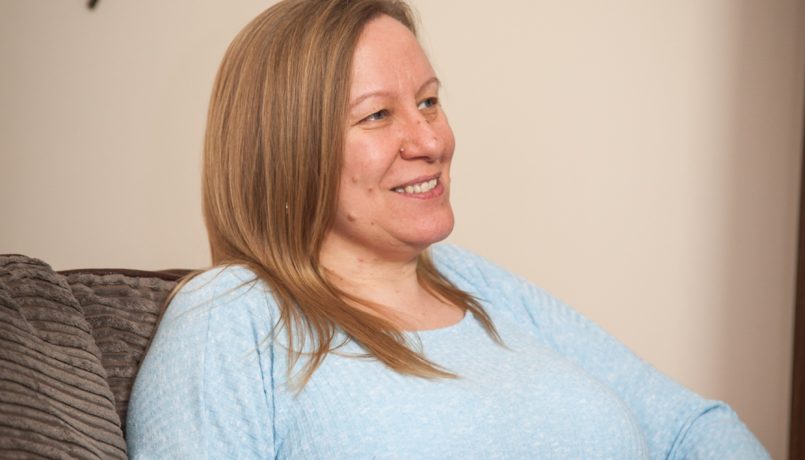Pam’s story
Pam’s story
Fostering for 21 years, 2 children of my own. I look after teenagers mostly and I’ve looked after over 30 children, but if you include respite children it’s 60 plus.

I’ve always been a single carer, but we’ve got all sorts of carers, married couples, single carers, same sex couples. I know a lot of our carers because I’ve been involved in training new foster carers, which is a great joy because it allows me to share my knowledge. It’s nice when foster carers that I’ve trained, phone me when they have a child in place.
I first thought about becoming a foster carer because one of my own children was at school with a looked after child and asked me if he could come and live with us, so I explained that we can’t have this child, but we could have other children come and live with us. Both my children said yes, so it was really my own children who got me into fostering and I’m really grateful for that!
Why Sandwell – there were quite a few people I knew already fostering for Sandwell so it seemed natural. I gave them a quick call, and it went from there.
I started off fostering younger children – I wanted my own children to be the oldest and influence them and over time I’ve just upped the age of the children I look after. My children, being in their late 20’s and early 30’s now live independently, so I do foster 0 to 18 year olds, but my preference is teenagers. I do enjoy working with teenagers. Some people may see them as difficult – I don’t, it’s just part of their nature, part of their experience and I think understanding their experiences helps me provide them with a better home life.
Sometimes a child can sound a lot worse on paper than what comes to you – I’ve found that in every case that I’ve cared for. They’ve all been a massive positive experience despite late nights, missing episodes. It’s all a wonderful experience – the children know that they have a home here and they know that despite what’s happened they can still come back and somebody’s still going to be listening to them, appreciating them despite what others may see as difficulties and issues, we will still value them and all their experiences – and that’s the positive that they can come back to.
Are you still in touch with some of the children you’ve looked after?
I am. Some of the children that have moved on to adoption I receive regular updates, which is absolutely lovely and my older children that have moved on to independence they visit regularly. One young lady comes round every week for Sunday lunch and another young man turns up occasionally on the sofa if he’s had an argument with his girlfriend – and it’s because they know where their home is. This is and always will be their home and this is their family.
It doesn’t just stop at 18 and I think that’s important, because everybody needs a family. Everybody needs to know they have someone they can turn to regardless of how old they are – I like to be able to provide that support no matter what it is.
There is also a big positive as Pam explains. I am now granny to two of my foster son’s children, they are now 7 years and 4 years old and I see them quite regularly.
The last baby that I cared for as a foster carer left us 5 years ago to live with gran, but we have a continuing role in her life because I’m her godmother, my son’s her godfather and my other foster son is godbrother and we see her regularly, it’s nice to have that continuing role in her life and have family events together, like Christmas.
Christmas’s are amazing in my house because we have pretty much all my previous teenagers and their respective others and in some cases their children now – so it’s manic, but it’s wonderful. As my mum says, I do thrive on chaos…and she may be right!
Is it possible to sum up your time as a foster carer?
I honestly don’t think it’s possible to sum up the whole experience as a foster carer because it’s an ongoing journey, it’s always changing, there’s always a new experience with every child that comes through the door because every child is an individual. So it keeps you thinking all the time and learning all the time. If I tried to sum it up I suppose I’d say it’s been a fantastic, chaotic and wonderful experience.

But it’s not always easy, as Pam admits, when it’s time to say goodbye to a child who may be going to start a new life with adoptive parents.
It doesn’t matter how long you’ve been fostering or what experiences you’ve had with a child, it is always going to be heart wrenching. Because at the back of your mind you are thinking ‘I may never ever see this child again’ and when they’ve had such a massive impact on your lives, your family’s lives and that comes crashing down in an instant… Once we know that a child is leaving for adoption we have to kind of change our mindsets from being carers to preparing the child to move on. So that it can be a positive experience for that child and the family the child is moving to, because our main aim is for it to work and be a positive experience.
Regardless of what our feelings are, the child needs to be happy and the family they go to need to be happy and confident that I’ve shared enough information for that child to be confident in their abilities. So that child needs to know that new mummy & daddy know exactly what her needs or his needs are and that’s all about me putting on a professional hat instead of an emotional hat and say ‘right, this is what I need to do for this child now, because they are moving on and I need to prepare everyone in the house for that’.
It is difficult, we can stave off the tears until the door closes – and I do say to my kids ‘nobody cries on the doorstep’ because I think the child may see that as a negative and think ‘what’s happening? Why are they crying?’ So that’s why I say to my children – no matter how old they are – nobody cries on the doorstep. But as soon as the door closes, it’s a dash for the tissues. Then we think about all the times we’ve had, all the experiences, all the great holidays we’ve had with them and their first experiences of doing everything with us.
That way we start to move on and compose ourselves ready for the next child. That’s the reality. As a foster carer I cannot cope without having a child to move onto. Some foster carers will need a couple of weeks break, but I can’t do that, because I would focus too much on the child that I’ve lost, so I need someone else to draw my attention for me to say ‘right I am now focusing on this child’.
What would you say to someone who’s thinking about fostering?
I would say take the step – take the plunge, because you never know something until you try. When I first started fostering I heard some quite negative views from other people, so I wanted to find out for myself what it was all about. You get a stereotypical image of what foster carers and the children are going to be like. I’ve always approached everything with an open mind and that’s what you need to do.
You need to look at it and think ‘you know what, I can do this’, because if I can do it, anybody can!
It’s about taking that first step, taking the plunge and giving it a try. So come to an event, listen to the views of other foster carers and just give it a go.
